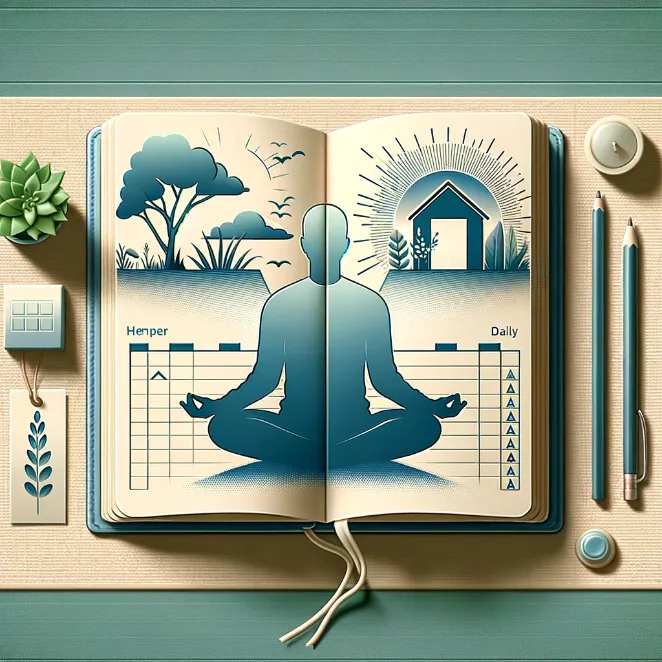
Cultivating Patience Through Meditation
In our fast-paced world, patience is a skill that often gets overlooked. However, it is a crucial element for achieving mental clarity and emotional balance. Meditation provides a unique pathway to cultivate this essential quality. By engaging in regular meditation, individuals can develop a deeper sense of patience, enhancing their ability to navigate the complexities of life with a calm and composed demeanor.
article by Hina Kurosawa
Understanding Patience in Meditation
Patience in the context of meditation is an active and intentional state of being. It involves embracing each moment without urgency, allowing thoughts and feelings to exist without immediate reaction. This kind of patience is not about passively waiting but actively observing. It's about learning to be comfortable with the pace at which things unfold, both during meditation and in life. As one meditates, the mind tends to wander, and it is in these moments that patience is practiced and honed. Each return to focus, each acknowledgement of distraction, strengthens the capacity for patience. Over time, this practice builds a mental resilience that is deeply rooted in patience.

Meditation Techniques to Foster Patience
Several meditation techniques are particularly effective for cultivating patience. Mindfulness meditation, focusing on the present moment, teaches patience by encouraging a non-reactive observation of thoughts and sensations. Breath-focused meditation uses the rhythm of breathing as an anchor, fostering a patient and steady mind. Progressive relaxation techniques, where attention is moved gradually through different parts of the body, help in developing patience as one mindfully releases tension. Loving-kindness meditation, or Metta, extends patient understanding and empathy towards oneself and others. Visualization practices, imagining serene landscapes or situations, also cultivate a sense of patient calm. Regularly practicing these varied techniques can significantly enhance one’s capacity for patience.
The Role of Patience in Stress Reduction
Patience plays a pivotal role in reducing stress and managing anxiety. When faced with stressful situations, a patient mind is less likely to react impulsively and more likely to respond thoughtfully. This approach reduces the immediate emotional impact of stress, allowing for clearer thinking and better decision-making. Patience, cultivated through meditation, provides a buffer against the pressures of daily life. It enables individuals to approach challenges with a calm, focused mind, thereby reducing the overall impact of stress on their mental and physical health. Over time, this cultivated patience becomes a natural response, greatly enhancing one’s ability to manage stress effectively.
Patience in Daily Life
The cultivation of patience through meditation has profound implications in everyday life. It enhances interpersonal relationships by promoting understanding and empathy. Patient individuals are often better listeners and more thoughtful in their responses, fostering healthier and more positive interactions with others. In professional settings, patience leads to better decision-making and problem-solving skills. It also helps in dealing with life's frustrations and setbacks, reducing the likelihood of anger and irritability. By integrating patience into daily life, individuals can enjoy a more harmonious existence, both within themselves and in their interactions with the world around them.
Overcoming Challenges in Cultivating Patience
Cultivating patience through meditation is not without its challenges. Initially, one might find it difficult to sit still for extended periods, or to keep the mind from wandering. These challenges are, in fact, opportunities to practice patience. Approaching these obstacles with kindness and understanding is key. It's important to remember that progress in meditation, and in cultivating patience, is often gradual. Setting realistic goals and being patient with oneself in the process of learning are essential. With time and consistent practice, overcoming these challenges becomes part of the rewarding journey towards greater patience and mindfulness.
Integrating Meditation into Daily Routines
Incorporating meditation into daily routines can significantly enhance the development of patience. Start by dedicating a few minutes each day to meditation, gradually increasing the time as you become more comfortable. Choose a specific time and place for your practice to create a consistent routine. Utilizing meditation apps or guided sessions can provide structure and guidance, especially for beginners. Remember that the quality of meditation is more important than the quantity; even short periods of focused meditation can be beneficial. Pairing meditation with daily activities, like walking or even during short breaks, can help in maintaining a regular practice. The key is consistency and the willingness to integrate meditation into everyday life, fostering patience in every moment.

The practice of meditation offers a powerful avenue for cultivating patience, a quality that can greatly enhance one’s quality of life. Through consistent practice and a willingness to embrace the challenges, individuals can develop a deeper sense of patience that permeates all aspects of their lives. This cultivated patience leads to reduced stress, improved relationships, and a more mindful, fulfilling existence. Embracing meditation as a tool for cultivating patience is an investment in one’s mental and emotional well-being, with benefits that extend far beyond the meditation cushion.
Published: 11/22/2023
Modified: 11/22/2023
More predictions
Come back here soon to learn more about yourself and your future


Harmonizing the Mind: The Power of Mantra Meditation
In our fast-paced world, finding tranquility can be a challenge. Mantra meditation offers a path to inner peace, using ancient words to quiet the mind and soothe the soul. This article delves into the art of mantra meditation, exploring its techniques, meanings, and the profound impact it can have on your life.


Sonic Serenity: Exploring Sound Meditation and Its Instruments
Sound meditation, also known as sound healing or sound therapy, is an ancient practice that uses various musical instruments to promote relaxation and healing. This form of meditation is based on the understanding that sound and vibration can profoundly affect our physical and emotional wellbeing. Unlike traditional meditation practices that often focus on silence or mantra recitation, sound meditation immerses participants in a landscape of soothing tones and harmonies. This article delves into the essence of sound meditation and the instruments that are pivotal in creating its unique and therapeutic soundscapes.